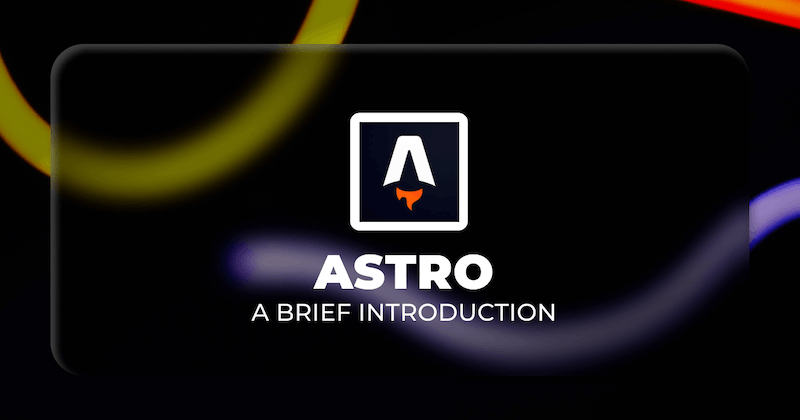Introduction
In today’s fast-paced digital world, where distractions are abundant and internet browsing is predominantly done on mobile devices, speed and page loading time are crucial factors. Astro, a web framework that can be used as a Static Site Generator (SSG) or a simple backend for rendering non-SPA pages, has emerged as a powerful tool in this context. Astro allows developers to build content-focused websites in a component-based manner, making it a versatile and efficient solution for web development.
The Rise of Astro
Astro is a modern static site generator and frontend framework that gained significant popularity in 2022. In fact, it ranked 7th among JavaScript star projects, accumulating an impressive 15k stars within just one year. What sets Astro apart is its creator, Fred K. Schott, the mastermind behind Snowpack, an influential unbundling build tool. With such a strong foundation, Astro has quickly caught the attention of developers and is considered by some as the best web framework for 2023.
The Problem with Excessive JavaScript
The web development landscape has been evolving rapidly, especially for JavaScript front-end developers. However, the rapid pace of change sometimes leads us to overlook the ultimate goal of creating websites and web applications: serving the users. With the rise of Single-Page Applications (SPAs) like Vue and React, there has been a tendency to create SPAs for almost everything, even for simple content-based websites.
While SPAs have their merits for building web applications, they come with their own set of challenges. Firstly, backend frameworks started optimizing for REST API responses, neglecting the rendering of HTML with template engines, especially in Node.js. Secondly, SPAs, being client-side rendered, present difficulties for search engine optimization (SEO) as search engine crawlers cannot see the content during indexing.
To address these challenges, server-side rendering (SSR) was introduced, allowing the execution of client-side JavaScript on the server for initial rendering. However, this approach requires a Node.js server, which can be cumbersome and costly, particularly for content-based websites. This led to the emergence of Static Site Generators (SSGs) and pre-rendering as a solution. SSGs existed even before the popularity of SPAs but gained traction due to the aforementioned challenges.
The Limitations of Existing SSGs
However, existing SSGs had their own limitations. Some were written in languages other than JavaScript, making it difficult to share UI components across different projects. Others, built with JavaScript using frameworks like Vue, React, or Svelte, resulted in excessive JavaScript due to hydration, which is unnecessary for every page. This is where Astro comes into play.
Astro was designed to address the limitations of traditional SSGs. One of its primary goals is to make it nearly impossible to build a slow website. In fact, tests have shown that Astro websites achieve a 40% improvement in loading speed compared to websites built with React Web frameworks. Moreover, Astro reduces the size of JS code by a staggering 90%.
The Astro Solution
Astro started as a JavaScript-based SSG that does not generate JavaScript by default on the client-side. Instead, it executes JS code during the build process, similar to SSR frameworks, but without hydration since most content-based websites do not require JS. However, when JS is needed, Astro provides flexible options.
You can continue using JavaScript as before, employing imperative DOM operations. Alternatively, you can leverage lightweight libraries like AlpineJS or Vue-petite, which provide minimal JS functionality. For advanced scenarios or when reusing UI components from other projects, Astro introduces “Islands.” These Islands are standalone components that can be imported from Vue, React, Svelte, and other frontend frameworks. They are individually rendered and injected into the final HTML, either statically (without hydration) or dynamically (with JS).
Unlike frameworks like Nuxt or Next.js, where nothing is static after the page loads due to full hydration, Astro generates truly static content. This means that unnecessary JavaScript injection is avoided, resulting in faster and more efficient websites. Additionally, Astro now supports SSR, allowing it to function as a simple backend framework with support for the best template engines available.
Why Astro is the Best Web Framework for 2023
In a world full of distractions, where browsing predominantly happens on mobile devices, speed and page loading are paramount. Astro, as a web framework, can be used as a Static Site Generator (SSG) or a simple backend for rendering non-SPA pages. Its versatility and extensive features make it an ideal choice for web development in 2023.
Here are some key reasons why Astro stands out as the best web framework:
Universal Template Engine
Astro supports external components from Vue, React, Svelte, Lit, Preact, and Solid JS, making it the most flexible and universal template engine available. This allows easy reuse of component representations across different projects.
Powerful Routing and Query Support
Astro provides file-based URL parameter routing and query support, enabling developers to create dynamic and personalized web experiences.
Image Optimization and Transformation
Astro offers built-in image optimization and transformation capabilities, improving website performance by reducing image size while maintaining visual quality.
Markdown and Frontmatter Support
Astro supports Markdown and frontmatter, allowing developers to seamlessly integrate rich content and metadata into their websites.
CSS Scope and SASS Support
With built-in CSS scope and SASS support, Astro empowers developers to create modular and maintainable stylesheets for their web projects.
Script Tag Scope and Binding
Astro provides script tag scope and binding, making it easy to integrate custom elements (web components) into websites.
Lazy Loading of Images and Components
Astro offers built-in lazy loading for both images and components, enhancing website performance by loading resources only when needed.
Static API Endpoint Support
Astro supports static API endpoints, enabling seamless integration with external data sources or services.
Multiple Runtimes
Astro supports multiple runtimes, including Node.js, Deno, and Bun. This flexibility allows developers to choose the runtime that best suits their project requirements.
Easy Deployment to Major Hosting Platforms
Astro can be easily deployed to popular web hosts, including edge providers like Netlify, Vercel, Cloudflare, Firebase, Surge, Render, Heroku, and more.
All of these features make Astro the ultimate tool for various web development needs, including event websites, checklists, tutorials, portfolios, marketing sites, video platforms, custom e-commerce sites, and even blogs or news websites. For simple SPAs, such as websites with a fixed audio player, Astro can be seamlessly integrated with Hotwire’s Turbo.
Now, with the new support for “View Transitions,” Astro can preserve the state during page navigation, providing a smooth user experience. Considering all these capabilities, it becomes evident why Astro is the best web framework for building content-focused websites in 2023.
Conclusion
Astro has emerged as a powerful web framework, offering developers a versatile solution for building efficient and high-performing websites. Its ability to optimize page loading speed and reduce JS code size makes it a standout choice in the ever-evolving web development landscape. With Astro’s extensive features, universal template engine, and easy deployment options, it is undoubtedly the best web framework for 2023. Embrace Astro and unlock its potential to create exceptional web experiences that captivate users in this fast-paced digital era.

